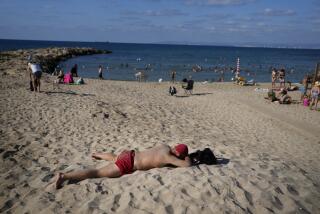Cultural exchange: Poet describes Israeli-Palestinian conflict in verse
“Sitting on the bus which is ticking to explode writing my last poem.”
--Eliaz Cohen
Suicide bombings are not the usual stuff of poetry, but Eliaz Cohen, a leading figure in a religious poetry scene flourishing in Israel, writes about the conflict in language as beautiful as reality can be ugly. Amid the drone of warring words, he offers a different voice, challenging political and religious convention.
“Hear O Lord,” the recently published bilingual collection translated into English by Larry Barak is Cohen’s literary chronicle of the last turbulent decade (it’s subtitled “Poems From the Disturbances of 2000-2009”). The decade began with a peace summit but collapsed into bloody violence, scarring Israelis and Palestinians.
“I did not try to sugarcoat the times with poems,” says Cohen, his work driven by deep love for his family and fear for them in a peace-less reality that is dangerous physically and spiritually.
Cohen questions the roles of man and God in the conflict, and gives neither any discounts. The volume draws its name from a prayer recited twice daily by observant Jews, pledging to love the Lord and remember his commandments. The religious poet has no qualms about role-reversing the canon. “And these sons who are being killed for you daily shall be upon your heart,” he demands from above.
The poet, 39, wears his curly hair long under his yarmulke -- and his heart on his sleeve. Not easy, considering there’s ample room in his heart for Palestinians too and he lives in the territories captured from Jordan in the 1967 war. In other words, a settler in the land Palestinians regards as theirs.
Cohen lives in a bloc of pre-state Jewish communities south of Jerusalem that fell in 1948. The historic drama lives on in the settlements rebuilt and expanded after 1967, equally so among the Palestinian neighbors. “There’s more than one story here,” he says over a bowl of cherries in his modest kibbutz kitchen.
The Nakba -- the “catastrophe” -- that befell the Palestinians with Israel’s founding -- “is incomparable to the Holocaust as an event but is no less formative a trauma,” he says.
Cohen recalls a magical boyhood in biblical and natural landscapes on the West Bank that he soon learned were not empty. “Reality is that there are two peoples here, both attached to one homeland in the deepest way possible,” he says.
Relations between Israelis and Palestinians echo the biblical story of Isaac and Ishmael, a recurring motif. He craves the brotherhood before it was betrayed by banishment:
“Ishmael is hurling stones -- / “Words” he shouts -- / at me / words harder than stones, and where were you / when they drove me away at dawn with a flask of water / our sons / Ishmael cries / will jostle within us... / will hurl at each other memories”
The second of the twinned poems about Ishmael is provocative.
Arab boys do it to me / they throw me three thousand seven hundred years / back / running naked, the hills arching / their green torsos to our bodies / our mothers thresh an envy offering, unawares / while Ishmael and I are sowing the winds of heaven
This one cost Cohen his job as a social worker in an ultraorthodox boys’ school, he says.
Although the Bible is a compulsory subject in school, its references draw a blank from many young Israelis. Cohen brings ancient layers of language into his work, no religious strings attached for those who don’t want them.
This is what is special about Cohen’s poetry, says poet Ronny Someck. “He speaks directly and clearly, putting everything in the display window and hiding nothing. But he does this in language that mixes contemporary Hebrew with that of a Jewish scholar.”
Cohen did many stints as an army reservist. His last one he spent manning a checkpoint in a beautiful setting in the Palestinian territories and reading the verse of the late Mahmoud Darwish, lauded as the national poet of the Palestinians.
Once, Cohen called Darwish. Correct and courteous, the elder poet insisted on English despite his good Hebrew. Cohen introduced himself as a “settler boy” and that was the end of that. That hurt, he says, still trying to complete the conversation 15 years later.
A married father of four, Cohen engages in a wide range of dialogue groups and joint projects with Israelis and Palestinians. Soon to be relieved of miluim -- military reserve duty -- he calls these his “miluim of peace.”
His neighbors don’t know what to make of him. Cohen became a darling of religious Zionists, expressing their perspective of pain during the “disturbances” of terror attacks, Israel’s disengagement from Gaza and the dismantling of Jewish settlements. Suspected at times of switching sides, he says he wears his poetic license “like a flak jacket” against criticism.
Time is running out for a two-state solution, some warn. This doesn’t scare Cohen, who’d prefer that the geographic space be shared in a settlement more like cohabitation than marriage or divorce. He envisions Israel and Palestine as two states working together under joint management. “It’s romantic and poetic but practical too,” he says. Cohen was less upset about the Palestinian bid to the United Nations for recognition as a state than many Israelis but would have preferred a joint move.
A while ago, he wrote Palestinian Prime Minister Salam Fayyad, introducing himself and his work. Fayyad didn’t answer but confirmed Cohen as a Facebook friend. “At least he didn’t hang up, that’s progress already,” a hopeful Cohen says with a shrug.
calendar@latimes.com
More to Read
The biggest entertainment stories
Get our big stories about Hollywood, film, television, music, arts, culture and more right in your inbox as soon as they publish.
You may occasionally receive promotional content from the Los Angeles Times.










